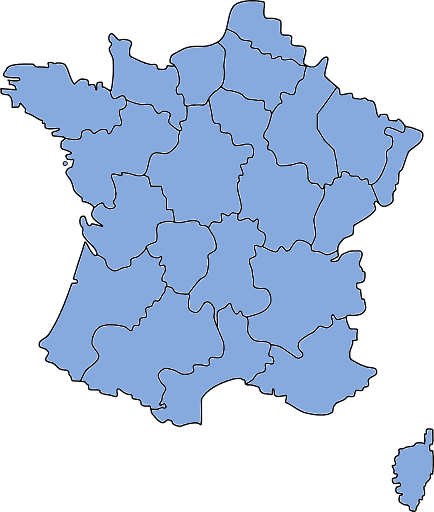Module 03: Les vacances
Quatrième Partie: L’Hexagone et les destinations francophones, Explication de grammaire
In this section:
- Le vocabulaire – learn the vocabulary about L’Hexagone
- Le vocabulaire en contexte
- Verbs in -ER stem changing
Le vocabulaire – learn the vocabulary about L’Hexagone

| L’Hexagone | France |
| l’Alsace (f)
la Bourgogne la Bretagne la Côte d’Azur la Corse l’Ile de France (f) (la région parisienne) la Lorraine la Normandie la Provence la Vallée de la Loire |
Alsace Burgundy Brittany the Riviera Corsica Ile de France (Parisian region) Lorraine Normandy Provence the Loire Valley
|
Le vocabulaire en contexte
Verbs in -ER stem changing
Review the conjugations and explanations. Do both exercises
Spelling changes occur in the stems of several groups of -er verbs in the present tense. These spelling changes reflect the pronunciation of the present tense forms.
![]()
You may have already noticed the spelling change in the verb s’appeler (Je m’appelle …, My name is …). For verbs like appeler (to call), rappeler (to call back) and jeter (to throw), the consonant –l or –t in the the stem doubles in all forms of the present tense, except in the first and second person plural (nous and vous). This follows the traditional boot pattern of -er verb conjugations in the present tense.
![]()
| appeler ‘to call’ | |
| j’appelle | nous appelons |
| tu appelles | vous appelez |
| il/elle/iel/on appelle | ils/elles/iels appellent |
| past participle : appelé | |
![]()
This same “boot” pattern is repeated in spelling change verbs like préférer (to prefer). In these verbs the é in the last syllable of the stem changes to an è, except in the first and second person plural (nous and vous). Listen carefully to the different pronunciations of é and è in the conjugations below.
| préférer ‘to prefer’ | |
| je préfère | nous préférons |
| tu préfères | vous préférez |
| il/elle/iel/on préfère | ils/elles/iels préfèrent |
| past participle : préféré | |
![]()
Verbs conjugated like préférer include:
| considérer, to consider |
| espérer, to hope |
| régler, to regulate, pay, settle, adjust |
| répéter, to repeat |
| sécher, to dry, skip (a class) |
![]()
In verbs which are conjugated like acheter (to buy), the e in the last syllable of the stem also changes to an è, again with the exception of the first and second person plural forms.
| acheter ‘to buy’ | |
| j’achète | nous achetons |
| tu achètes | vous achetez |
| il/elle/iel/on achète | ils/elles/iels achètent |
| past participle : acheté | |
![]()
Verbs conjugated like acheter include:
| amener, to bring somebody (along) |
| emmener, to take somebody (along) |
| lever, to lift, raise |
| mener, to take, lead |
| peser, to weigh |
![]()
Another group of stem-changing verbs include those ending in –ayer, including essayer (to try) and payer (to pay). In these verbs the y changes to i in all persons except the first and second person plural (nous and vous).
![]()
| essayer ‘to try’ | |
| j’essaie | nous essayons |
| tu essaies | vous essayez |
| il/elle/iel/on essaie | ils/elles/iels essaient |
![]()
Finally, verbs ending in –ger like voyager (to travel) add an e after the g in the nous form of the present tense, so that the g is pronounced as a soft sound before the –ons ending (i.e. nous voyageons). Similarly, in verbs ending in –cer, commencer (to start), for example, the c in the nous form changes to ç to keep the soft c sound (nous commençons).
![]()
| voyager ‘to travel | |
| je voyage | nous voyageons |
| tu voyages | vous voyagez |
| il/elle/iel/on voyage | ils/elles/iels voyagent |
| past participle: voyagé | |
![]()
Other verbs in this category include:
![]()
| corriger, to correct |
| exiger, to demand, require |
| manger, to eat |
| nager, to swim |
| partager, to share |
| ranger, to tidy up, arrange |
| rédiger, to write, compose |
| songer, to dream, reflect |
| Quelle activité est-ce que vous préférez en été? | What activity do you prefer in the summer? |
| Rita: J’emmène mes enfants à la piscine. | Rita: I take my children to the pool. |
| Ses enfants: Nous nageons et nous mangeons de la glace. | Her children: We swim and we eat ice cream. |
| Sacha: Moi, je préfère lire dehors. Je lit beaucoup. | Sacha: Me, I prefer reading outside. I read lots. |


